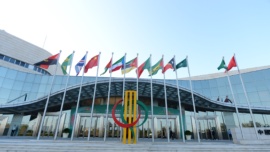The recent IMF report on Macau touched, as it was inevitable, on the issue of diversification. One of the highlights is the government’s intention to develop financial services. The report quotes the region’s five-year plan on the subject, and the issue was undoubtedly touched upon during contacts with the local authorities. The document’s comments are, however, somewhat guarded. It is an area to ‘explore,’ they concur; but ‘further work would be useful to establish both Macao SAR’s comparative advantage and the potential cost-benefit’ of doing so. In other words, it is not clear what we are talking about.
The close cause for this focus on financial ‘diversification’ is not difficult to pin. Indeed, the Chinese Premier gave a robust and positive sign on the subject in his recent visit. But after that strong signal, it is for others to clarify the details; namely, which services the local financial sector can provide, and how they will develop the opportunities identified there. Here the details are wanting.
What are, in practice, the new or extended services that local banks may offer in renminbi? Will all the local banks be allowed (let alone be able) to provide those services? Which profiles, if any, need those banks (or their customers) fit? What might be the required changes to legal and administrative procedures? At some point, these issues will need clarification.
Then, questions pop up regarding the labour and economic impacts. Unless someone has figured out how Macau can become a major financial centre at short notice – in which case we would expect more details to be forthcoming without much delay – those impacts are likely to be modest.
Let us assume that the ‘new’ set of authorised operations requires sophisticated labour skills. For all the talk about local talent, Macau is unlikely to provide the necessary workforce. Even leaving aside the current sensitive levels about labour imports, where will those experts come from? When and at what cost? Contrariwise, if the skill pool is available in Macau, the ‘new’ services are likely to be limited in size, or technically undemanding, or both. Their contribution to the local economy cannot be too great.
The provision of international financial services is a sensitive area in economic, political and diplomatic terms. Once we try to peer beyond the declarations of intent, unanswered questions abound. Unless some bold roadmap is drawn up, the diversification outcomes might turn out to be quite limited.























